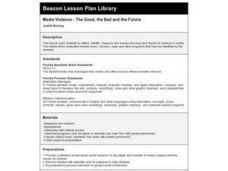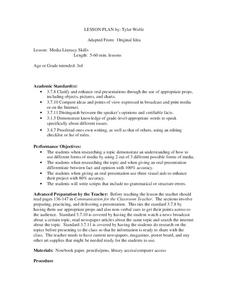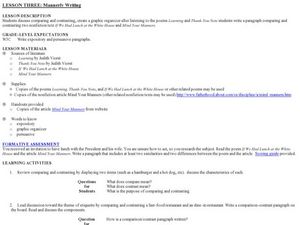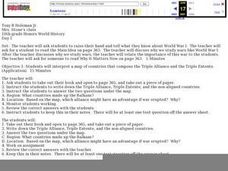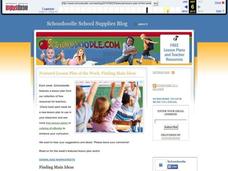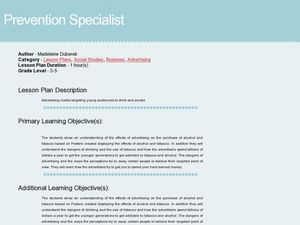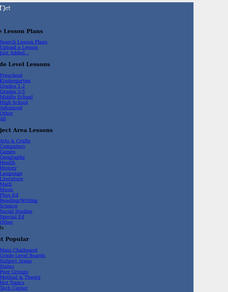Curated OER
The Emperor and the Kite
Fourth graders develop critical listening skills and answer four questions related to the story, THE EMPEROR AND THE KITE. They identify the main idea and recall a question that involves making a judgment.
Curated OER
Comprehension: Identify the Main Idea from Text
Children in first grade listen and read along with the teacher to practice main idea identification. They use the provided reading passages to read, locate the main idea and supporting details. This is a fully scripted instructional...
Curated OER
Put Your Habits to Work in Math
Learning how to read an expository text is an essential skill. The questions on this two-page worksheet lead pupils to understand that the title, heading, diagrams, photographs, problems and captions all support the main idea of a...
Curated OER
Main Idea in Informational Text
Readers identify main ideas and supporting details using informational texts. In this literacy lesson, they make predictions and read the text to find the main ideas. They use a table diagram to define the main idea and supporting...
Curated OER
Identify Intended Media Messages
How does media convey different messages? Use this lesson to explore media by identifying and analyzing selected images. Middle schoolers analyze a poster and discuss the intended meaning of the imagery and how it makes them feel. They...
Curated OER
Finding Main Ideas
What is the main idea? Previewing a text is a great way to identify the main idea without even reading, but what areas of a text do you preview? Teach your third, fourth, and fifth graders the most important areas to preview before...
Curated OER
Plot the Oysters' Peril!
Use comic strips to teach sequencing in narrative poetry. As homework, each class member selects a comic strip with 4-8 frames, cuts the frames apart, places the pieces in an envelope, and brings the envelope to class. Class members swap...
Curated OER
Media Violence - The Good, the Bad and the Future
Third graders define, identify, measure, and assess the level and impact of violence in media. The media forms evaluated include music, sitcoms, news, and other programs that are identified and shared by the class.
Curated OER
Counteracting Media Stereotyping
Discuss media stereotypes with your emerging consumers. They view a television program to identify gender bias. After discussing the clip as a class, each learner writes a story showing more equitable roles. Or consider having them...
Curated OER
Media Literacy
Elementary learners observe and discuss advertisements for tobacco and alcohol. They identify how advertisers place information in strategic spots and make their product look good. They choose an ad and fill out the attached form on...
Curated OER
Media Literacy Skills
You're on camera! Third graders find a news story and research it to get more information. Everyone uses their found information to write a script and create their own news broadcast!
Curated OER
Use Details from Text to Identify Cause and Effect, Draw Conclusions, Compare and Contrast
Third graders discuss research topics and write a paragraph on one of the provided questions. They focus on including key words from charts that the class has been compiling. They underline supporting details within the text they write....
Curated OER
Mannerly Writing
Writers draft paragraphs comparing and contrasting the author's viewpoint in two poems. They also discuss the differences between an informational text and a poem regarding manners. Rubric and assessment are provided.
Curated OER
Spots the Barn Cat: Finding the Main Idea
Spots the barn cat is the subject of this colorful worksheet. Young learners demonstrate their ability to identify the main idea in a written passage by reading a short passage about Spots and responding to the prompt asking them to...
Curated OER
Summarizing with James and the Giant Peach
Elementary readers in literature groups practice summarizing chapter-by-chapter with Roald Dahl's James and the Giant Peach. Focus on main idea, supporting details, and the 5 Ws. Unfortunately, a clever "peach" graphic organizer to which...
Curated OER
WWI for World History Honors
Using a textbook, learners will examine various aspects related to the Triple Alliance of WWI. They complete a series of handouts, engage in a class discussion, and interpret a map showing both the Triple Alliance and the Triple Entente....
Curated OER
Paragraphs: Main Idea and Supporting Details
This is a great way to review the concept of main idea and supporting details with younger learners. Learners read two short passages and identify the main idea and supporting details using visual prompts and a graphic organizer.
Curated OER
Finding Main Ideas
Elementary schoolers read paragraphs one at a time in order to pick out the main ideas. They choose which sentences are most important in a paragraph. This type of exercise prepares learners to identify the main idea in longer narratives.
Curated OER
Advertising Media: Youth Drinking and Smoking
Scholars examine the effect of media and advertising on youth drinking and smoking. They determine what advertising means, how much money is spent on it, and how different age groups are targeted. They watch a movie and examine pictures...
Curated OER
Classifying Information About a Main Idea
Elementary learners explore language arts by completing a text identification activity. They discuss the importance of a main idea in a story or paper and how to present it properly. Then they practice identifying the main idea in sample...
Curated OER
Teaching "Theme" with Children's Literature
In this exercise, learners examine the difference between a theme, topic, and moral. After a class discussion on the definition of literary themes, the instructor reads The Cello of Mr. O by Jane Cutler. Next, individuals analyze the...
Curated OER
Writing Children's Literature
Young scholars examine the common themes and characteristics of children's literature. They develop a list of characteristics, read and discuss examples of children's literature, and create an original children's book.
Curated OER
Little Red Hen
First graders listen to the story "The Little Red Hen". They buddy read the story and then illustrate their own interpretation of the story on story paper. Students then use AlphaSmart to type their stories in sequential order.
Curated OER
Why Do Authors Write?
Sixth graders use short reading passages to identify, explain, and discuss the author's purpose for writing. After a lecture/demo, they utilize a graphic organizer embedded in this plan to organize their writing ideas.









